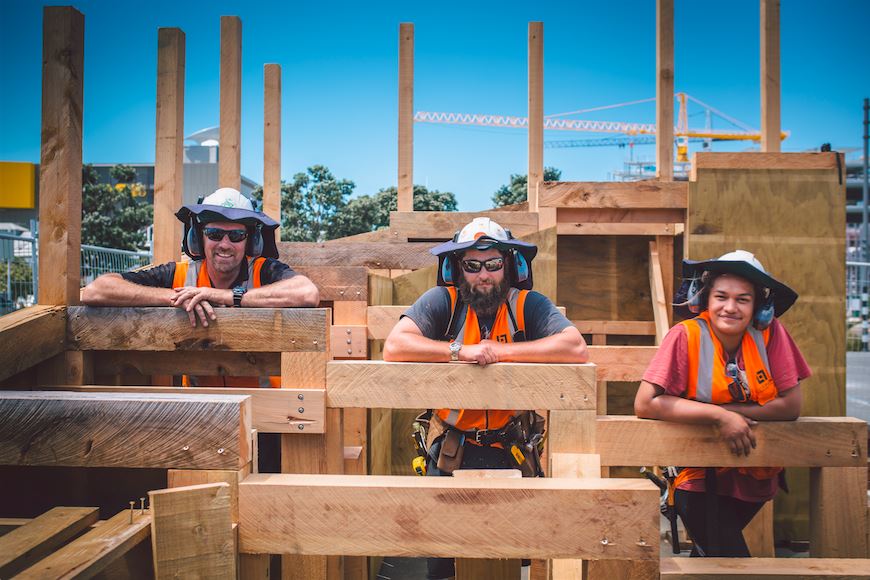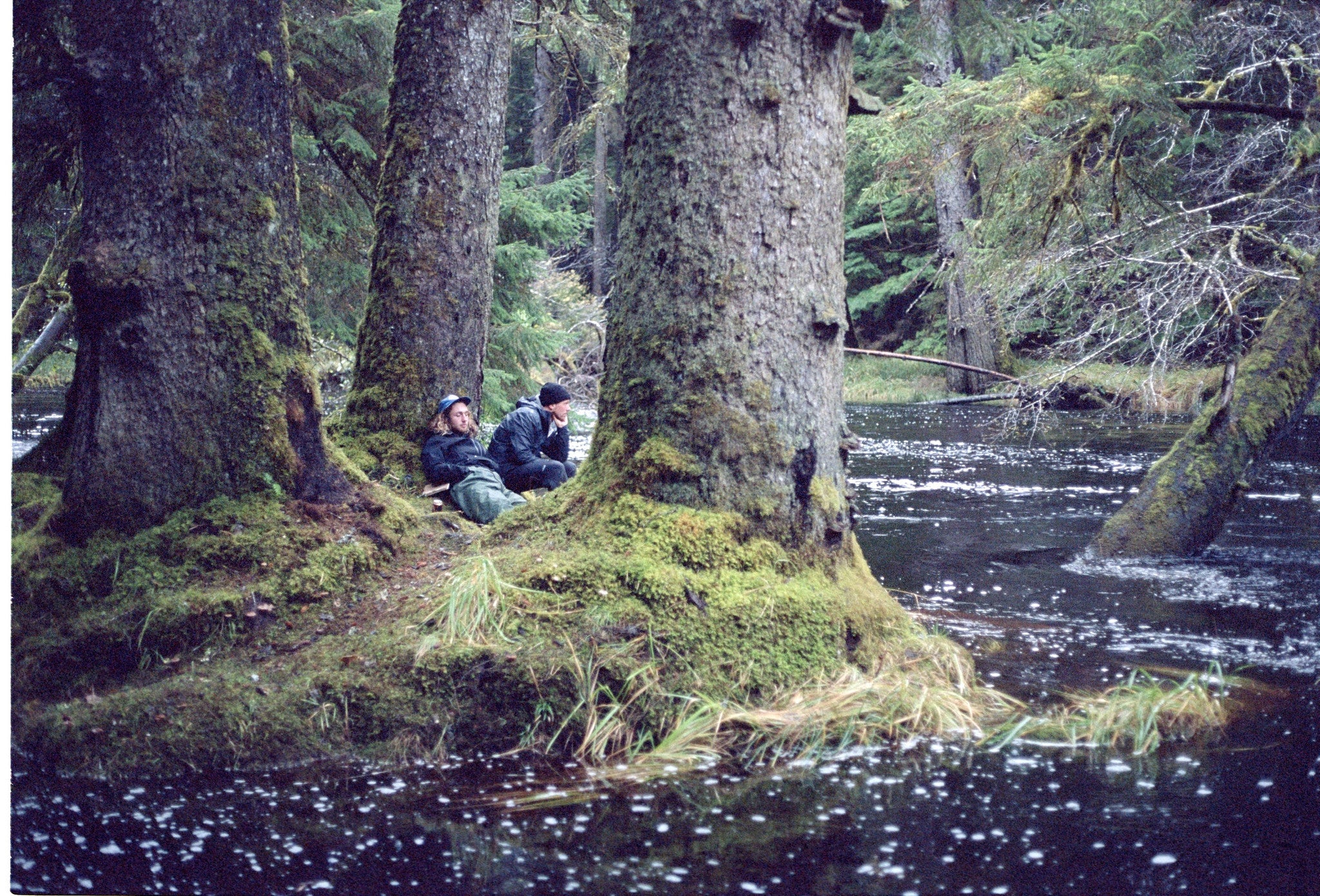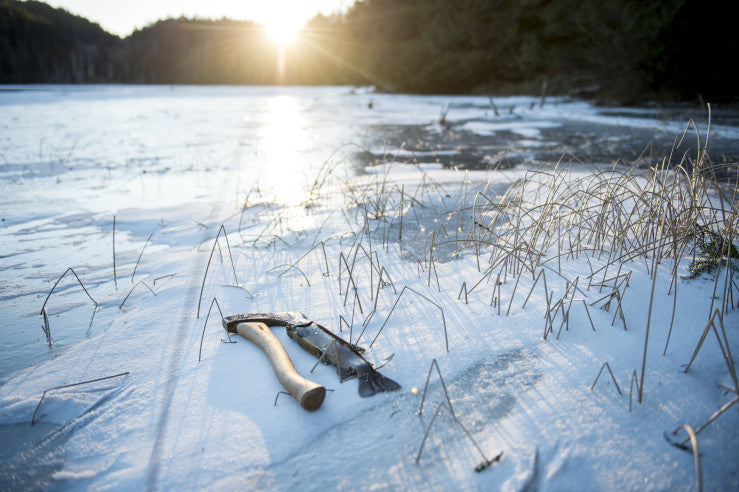
Some of the crew takes a rest. Photo provided by Andrew Howson.
With the help of Sitka New Zealand, Sustainable Coastlines raised 80 thousand dollars at the end of November in a Kickstarter campaign funding the construction of a fully sustainable Flagship Education Centre in the heart of Auckland. Sustainable Coastlines’ online campaign describes the nearly completed centre as “Auckland’s epic new community space made from waste”—and the Flagship will be just that. Not only will the building provide a meeting place for environmental activism and knowledge, but its very construction sets an example of sustainability.
The entire building will be made from upcycled waste and responsibly sourced material. Upon completion early this year, the centre has the potential to stand as New Zealand’s most sustainable building. In addition, Sustainable Coastlines has been building parts of the Flagship inside a high-security prison. The organization is providing inmates with valuable construction training from skilled professionals. With many reasons to back Flagship Education Centre, a mass of volunteers and supporters have contributed to the centre’s creation and the Kickstarter project raised 20 thousand dollars over Sustainable Coastlines' initial goal.
Sustainable Coastlines is an award-winning charity encouraging people to care for N.Z.’s coastlines and waterways. The group organizes large scale beach clean-ups and waterway rehabilitation projects, on top of running educational programs and public awareness campaigns about local ecological issues. Sustainable Coastlines became established in 2010, coinciding with the opening of Sitka’s only offshore store in Auckland. Nearly seven years ago, Sitka N.Z. owner Andrew Howson met Sustainable Coastlines CEO Sam Judd during a beach clean-up, and a partnership based on shared environmental passion has maintained ever since. Sitka N.Z. works closely with Sustainable Coastlines and donates at least one percent of all revenue to the group’s initiatives.
Howson uses the pronoun “we” when referring to Sustainable Coastlines as Sitka is proud to be one of the non-profit’s main sponsors. “We have a strong passion to do things in a better way,” he says. Every aspect of the Flagship Education centre is “creative and revolutionary.” The Flagship Centre will be open seven days a week, sell Sitka gear, and provide a meeting place for motivation and progression.

Meet Sitka New Zealand. Photo provided by Howson.
Once finished, the Flagship will undergo an eight month long audit called Living Building Challenge. This trial is run by an external organization and will measure the level of environmental consideration involved in the building’s construction. The audit, founded by an international group called the Living Future Institute, works to encourage the creation of self-sustaining buildings. If the Flagship passes inspection, it will be considered a ‘Living Building’.
“The guidelines are hard to achieve,” says Howson. Howson explains how the organization will examine the environmental impact of all materials used to build the centre, including the screws holding framework together and the wrapping around electrical copper wires.
In adherence to the Living Building Challenge guidelines, the Flagship Education Centre will be created using Earth Bricks, which are pressed in N.Z. and made from local sandstone, and the building’s framework will be made from upcycled 40 foot shipping containers which could be sitting in a landfill otherwise.

Shipping containers. Photo provided by Howson.
Although environmentalism is the motivator for action at Sustainable Coastlines, the philanthropic element to the Kickstarter project strikes a chord with Howson. He describes personal fulfillment from collaborating with tradespeople and inmates inside the prison. Howson explains watching inmates’ attitudes and behaviours change for the better as they contribute to the Flagship Centre. “For the first time in some of their lives, [these people] have had an opportunity to do something good,” he says. Howson says that having the ability to work with the prison has widened his sociological perspective.
Aside from the Flagship Education Centre, there are more reasons to suggest Sustainable Coastlines is a cutting-edge organization. Every coastal clean-up conducted by the group is numerically measured, meaning that the garbage is organized and accounted for. Unlike other clean-up projects, every cigarette and lollipop wrapper that Sustainable Coastlines collects contributes to statistics that have been key in helping the organization gain external funding. The group can numerically track the impact of their efforts. “We can say we’ve removed 2.5 tons of rubbish from this beach, that we’ve engaged 74 people in the community, and that 300 kids from the local school heard our presentation,” explains Howson.

Sunny days and hard workers. Photo provided by Howson.
Environmentalism is important in New Zealand according to Howson. He says that government is applying increasing pressure to open coastlines to deep sea oil drilling. The country faces other environmental issues including farming pollution that causes rivers and beaches to be virtually un-swimmable. “Together we can do something,” says Howson.
“The values that Sitka holds dear ring true to people [in New Zealand] because they are passionate about the same things,” Howson says, “Our greatest asset is our environment.”
To learn more about Sustainable Coastlines, visit: sustainablecoastlines.org
-->


